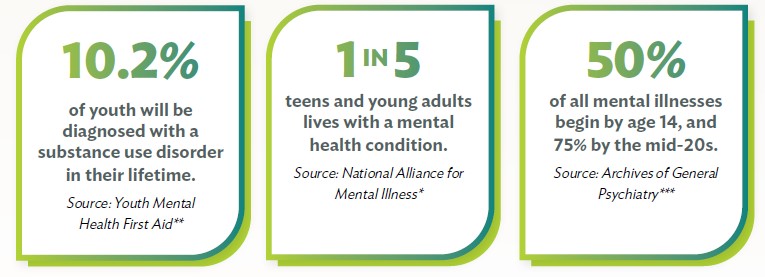
ENROLL NOW
FREE COURSE TAUGHT: ONLINE
THURSDAYS, MARCH 26th & APRIL 2nd, 2026 TO SIGN UP: Email: wccc@washcokids.org
THURSDAYS, MARCH 26th & APRIL 2nd, 2026 TO SIGN UP: Email: wccc@washcokids.org
ENROLL NOW
“As adults, we sometimes forget how hard it was being an adolescent. When we see a kid who is just miserable at school, we might think they choose to be that way – or that it’s just part of adolescence. But in fact, they might be in a mental health crisis, one they certainly did not choose and do not want. When a teacher says, ‘How can I be helpful?’ that is a powerful question”
— Alyssa Fruchtenicht,
school-based mental health counselor
— Alyssa Fruchtenicht,
school-based mental health counselor
WHY YOUTH MENTAL HEALTH FIRST AID?
Youth Mental Health First Aid teaches you how to identify, understand and respond to signs of mental illness and substance use disorders in youth. This 6-hour training gives adults who work with youth the skills they need to reach out and provide initial support to children and adolescents (ages 6-18) who may be developing a mental health or substance use problem and help connect them to the appropriate care.

THREE LEARNING OPTIONS
- VIRTUAL. First Aiders will complete a 2-hour, self-paced online course, and then participate in a 4.5 to 5.5 hour, instructor-led video course
- BLENDED LEARNING. After completing a 2-hour, self-paced online course, First Aiders will participate in a 4.5-hour, in-person, Instructor-led class.
- IN-PERSON. First Aiders will receive their training as an 8-hour, Instructor-led, in-person course.
WHO SHOULD TAKE IT
TEACHERS
SCHOOL STAFF
COACHES
CAMP COUNSELORS
YOUTH GROUP LEADERS
PARENTS
PEOPLE WHO WORK WITH YOUTH
WHAT IT COVERS
- Common signs and symptoms of mental illness in this age group including
- Anxiety
- Depression
- Eating Disorders
- Attention deficit hyperactive disorder (ADHD)
- Common signs and symptoms of substance use
- How to interact with a child or adolescent in crisis
- how to connect the person with help
- NEW: Expanded content on trauma, addiction and self-care and the impact of social media and bullying
The course will teach you how to apply the ALGEE action plan:
- Assess for risk of suicide or harm.
- Listen nonjudgmentally.
- Give reassurance and information.
- Encourage appropriate professional help.
- Encourage self-help and other support strategies.
ENROLL NOW
FREE COURSE TAUGHT: ONLINE
THURSDAYS, MARCH 26th & APRIL 2nd, 2026
TO SIGN UP: Email: wccc@washcokids.org
ENROLL NOW
Washington County Coalition for Children
To be a voice that advocates for the health and well-being of children and families, serving as catalyst and facilitator, in creating a culture where all children in Washington County can thrive.
The Washington County Coalition is a RI nonprofit organization
functioning under the fiscal sponsorship of
Wood River Health
823 Main Street
Hope Valley, RI 02832
wccc@washcokids.org
functioning under the fiscal sponsorship of
Wood River Health
823 Main Street
Hope Valley, RI 02832
wccc@washcokids.org


